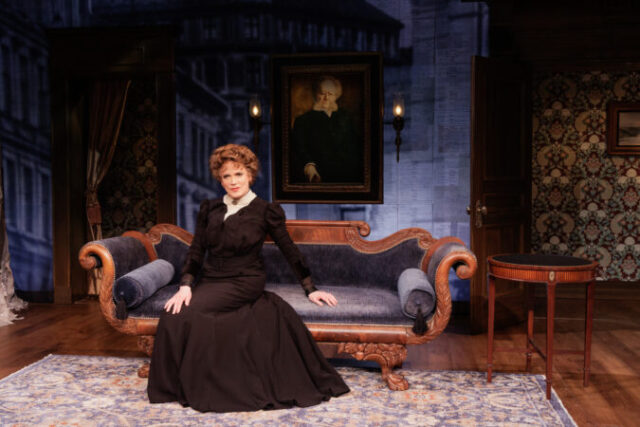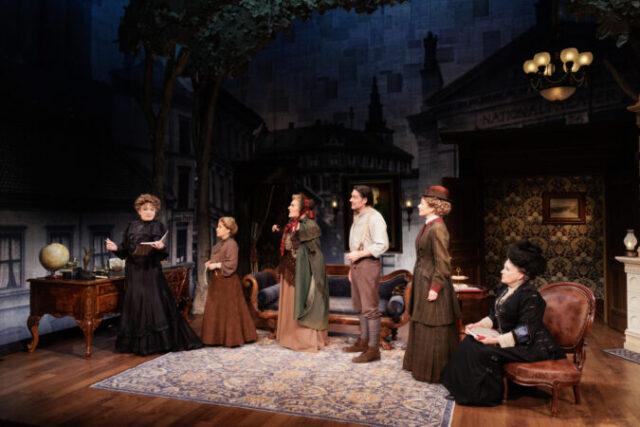
Charles Busch is elegant as a très chic widow trying tp protect her late husband’s legacy in Ibsen’s Ghost (photo by James Leynse)
IBSEN’S GHOST
Primary Stages, 59E59 Theaters
59 East 59th St, between Park & Madison Aves.
Tuesday – Sunday through April 14, $66-$131
212-279-4200
www.59e59.org
“Some novelist or playwright might conjure forth an irresponsible fantasy inventing relationships and conflicts that don’t exist,” Suzannah Thoresen Ibsen says in Ibsen’s Ghost. “He might remove Hanna from the wings and place her center stage. Imagine, my love, what diabolical tomfoolery could be made of us.”
There’s “diabolical tomfoolery” aplenty in the play, written by Charles Busch, who portrays Henrik Ibsen’s widow, served up with a plethora of camp, Busch’s stock in trade. But there’s a lot more to the story, a hilarious testament to gender identity and women’s sexuality.
Henrik Johan Ibsen is Norway’s most famous and respected playwright. In such works as Brand, Peer Gynt, A Doll’s House, Ghosts, An Enemy of the People, The Wild Duck, Rosmersholm, and Hedda Gabler — each of which is referenced directly or indirectly in Ibsen’s Ghost — Ibsen explored class struggle, the social order, religious intolerance, politics, family life, and women’s place in society. “Castles in the air — they are so easy to take refuge in. And easy to build, too,” the revolutionary dramatist and father of realism wrote in The Master Builder.
A coproduction of Primary Stages and George Street Playhouse running at 59E59 through April 14, the two-hour show (with intermission) is set in the Ibsen home in Oslo in June 1906, shortly after Henrik died at the age of seventy-eight. His longtime publisher, George Elstad (Christopher Borg), has arrived at the house and asked Suzannah (Busch), her husband’s literary executrix, to examine the personal letters the couple had exchanged over the course of their nearly fifty-year marriage.
“We will see him in every future play that lifts the iron lid off polite society,” George boasts. Suzannah offers, “To contribute to that legacy, I have decided to relinquish these letters that have been moldering in a safe deposit box over at the Royal Oslo Bank. I see them as the foundation for a compelling and important book.” The excited George replies, “The letters of Henrik Ibsen are of immense literary importance and, I might add, as his publisher, of remunerative value.” But he is disappointed to discover that the letters are merely everyday domestic conversations that contribute no insight into Henrik’s genius, so he rejects them. An outraged Suzannah declares, “How dare you, George Elstad, how dare you slap me across the face with my insignificance! You, a pretentious, ineffectual bourgeois!”
That exchange gets to the heart of the play, the position of the wife, or any woman, as it relates to a famous man’s contributions to the world. Suzannah was a writer herself, having translated German author Gustav Freytag’s Graf Waldemar into Norwegian, but she gave up that potential career in order to assist in her husband’s labors, serve as muse, and raise their son, Sigurd, a lawyer and statesman who has become the prime minister. (Busch adjusts the actual timeline here, as Sigurd was prime minister from 1903 to 1905 so was not in office when his father died.)
Suzannah encounters a sailor sneaking about who turns out to be Wolf (Thomas Gibson), Henrik’s illegitimate son from an old dalliance, long before he met Suzannah, with an Irish servant girl; Suzannah tells Wolf that she was aware of his existence. He is seeking a keepsake from his father, but Suzannah soon involves him in more illicit behavior. (Henrik did have an illegitimate son with a maid, but Wolf’s tale is invented.)
Suzannah is visited by Magdalene Kragh Thoresen (Judy Kaye), her stepmother, a successful author in her own right and a thorn in Suzannah’s side. Apparently apologizing, Magdalene says, “Suzannah, I feel dreadful that I haven’t seen you since the funeral. And my blundering rudeness in criticizing your appearance as the coffin was being lowered into the ground. . . . But, Suzannah, my darling, that wrinkled polka dot veil.” Suzannah responds, “I wasn’t wearing a veil.” A moment later, Magdalene describes a dinner party she attended at which she “spent nearly an hour devouring each heavenly morsel.” Suzannah remarks, “Your favorite pastime. Picking the flesh off bones.”
The next day, Suzannah meets with George, Magdalene, and Hanna Solberg (Jennifer Van Dyck), who is peddling a tell-all about her relationship with Henrik. Suzannah explains that “she was the first of my husband’s princesses. . . . His acquaintanceship with these women was purely intellectual.” Hanna says that although she might have been “a vestal virgin at Ibsen’s altar,” she promises, “My diary will shed light on some unwelcome truths.” Suzannah and Hanna, who is harboring another major secret, debate over who was more of a muse to Henrik, arguing especially over who was the inspiration for Nora in A Doll’s House; Suzannah is enraged that Hanna’s book is entitled I, Nora.
In the second act, the Rat Wife (Borg) — a character in Ibsen’s 1894 play, Little Eyolf — knocks on the door, asking, “Have you good people any troublesome thing that gnaws here?” Suzannah demands that she leave, but she snoops around the room, noting, “There is something sad and grey lurking within the walls.”
Meanwhile, through it all, Gerda (Jen Cody), the housekeeper, never stops catering to the guests, entering and leaving with a torturous, twisted limp that is painful to watch but also, surprisingly, brings her pleasure. “Didn’t Dr. Esbjornsen diagnose that the curvature of your spine might lead to unwanted sensations in the pubis?” Suzannah asks her early on. Gerda answers, “That humiliating diagnosis is etched in my memory.” Later, Gerda explains, “I’ve done my best to keep [the house] neat and clean. I am just one person with a crooked patella, a tilted coccyx, and a flat foot with a plantar’s wart.” But she is more than just additional comic relief in this clever comedy.

Ibsen’s Ghost features a marvelous cast at 59E59 (photo by James Leynse)
Ibsen’s Ghost is a fast and furious feminist romp. The fictionalized but all-too-true world created by writer and star Busch (The Confession of Lily Dare, The Tribute Artist) and his longtime director, Carl Andress (The Divine Sister, Die, Mommie, Die!), tackles numerous women’s issues with grandiose humor that reveals historical and contemporary truths. Speaking to Wolf, who says his “surname has always been up for question,” Suzannah rhetorically replies, “We have much in common. Am I Suzannah Ibsen or Suzannah Thoresen? Who is Suzannah Ibsen?”
Each of the female characters in the play wrestle with who they are, professionally, personally, and sexually. Hanna wears trousers, writes books as a man, and has left her husband for a young painter “who loves me first as a human being and then as a woman.” Magdalene is a widow intent on making a name for herself as a writer, working at the same time on “a play, a novel, an opera libretto, a cycle of poems, a ballet scenario, and three short stories.” The Rat Wife is known as “the Rat Woman, Mother Rat, Madame La Rat, and, in some quarters, Lady Rat-Face,” not exactly kind sobriquets given the services she actually renders. Suzannah is trying to assert her part in her husband’s career while also exploring her future as a single woman who is ravenous for sex. And Gerda can barely move an inch without experiencing horrific pain and tantalizing orgasms.
Shoko Kambara’s set is a lovely living room with Victorian furniture, including a vertical porcelain stove. Two tall trees rise from either side, extending their branches and leaves over the space, melding interior and exterior. The outside neighborhood is projected onto the walls and back of the room, making it appear that the large doors stage right lead directly into the National Theatre, where, in real life, a statue of Ibsen stands guard. Ken Billington’s lighting and Jill BC Du Boff and Ien DeNio’s sound amp up the kitsch with cinematic flair. Gregory Gale’s costumes and Bobbie Zlotnik’s hair, wig, and makeup are fun and fanciful, from Suzannah’s black capelet and flowing gown and her bright-colored bedclothes to Hanna’s archery outfit, the Rat Wife’s fussy frock, and Magdalene’s extreme hats and coifs.
Tony nominee Busch (The Tale of the Allergist’s Wife, Vampire Lesbians of Sodom) is fabulous as Suzannah, articulating her fears and desires, her hopes and dreams, her pride and shame in a turn of the head, a blink of an eye, the raising of an brow, or a knowing glance at the audience. Busch has full command of the stage and the character; he performs in drag so well that his standby is Kate Hampton, a woman.
Two-time Tony winner Kaye (Phantom of the Opera, Nice Work If You Can Get It) is resplendent as the gossipy Magdalene, Borg (The Confession of Lily Dare, Judith of Bethulia) is a blast as the serious George and the mysterious Rat Wife, Gibson (Chicago Hope, Dharma & Greg) is appropriately hunky as the not-so-bad Wolf, and Cody (Shrek, Urinetown) is uproarious as the physically hampered Gerda, but Van Dyck (Hedda Gabler, Dancing at Lughnasa) gives Busch the most run for his money as the bold and brazen Hanna; the two actors chew up as much scenery as is humanly possible, matching their characters’ intense rivalry. I can’t remember the last time so many scenes in a play were greeted with instant, joyous applause.
Hovering over it all is Henrik Ibsen himself, ever-present in a large portrait on the back wall behind the settee. I’d like to think his ghost is enjoying the show as much as audiences are, if not more.
[Mark Rifkin is a Brooklyn-born, Manhattan-based writer and editor; you can follow him on Substack here.]